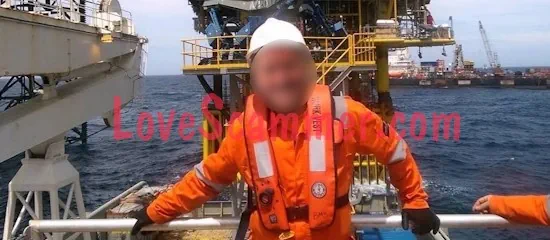Oil Rig Scams: Are You Falling Prey to an Oil Rig Scammer?

Online oil rig scams use fake “oil rig engineers” and offshore workers to build trust, create intense romance and then pressure you into sending money.
An oil rig scammer often claims to be stuck on a remote platform with no access to funds, using dramatic emergencies to make their requests sound urgent and believable.
This guide explains how oil rig romance scams really work, how to recognize the red flags and what to do if you suspect your “oil rig engineer” is a scammer.
Quick check: Is it an oil rig romance scam?
- They claim to work on an offshore oil rig and can never meet or video call.
- They move fast emotionally and talk about love or marriage within days or weeks.
- They ask for money for emergencies, tickets, equipment, customs or “frozen accounts”.
- They refuse independent verification or get angry when you hesitate.

Claiming to work on a remote oil rig is a common cover story for romance scammers because it explains away cancelled visits, poor connections, and sudden money requests.
What Is an Oil Rig Romance Scam?
An oil rig romance scam is a type of online dating scam where someone pretends to work on an offshore oil rig to gain your trust, affection, and eventually your money. The scammer usually creates a fake profile as an oil rig engineer, contractor, or supervisor, then quickly builds an intense romantic connection before inventing financial emergencies.
These scams often start on dating apps or social media and move to private messaging apps where there is less oversight. The goal is always the same: to make you feel responsible for helping them so you send money, share sensitive information, or both.
Understanding how oil rig scammers set up and run these schemes makes it easier to recognise the warning signs before you lose money or personal data.
How Oil Rig Scammers Operate
Oil rig scammers rarely rush straight into asking for money. Instead, they follow a pattern: they create a believable identity, build an intense emotional bond, and then slowly introduce financial problems that only you can “solve”. Understanding this pattern makes it easier to see through the lies before you lose money or personal data.
Typical Stories and Excuses
Oil rig romance scammers rely on a small set of dramatic, repeating stories that are designed to create urgency and guilt. They often claim to be stuck on a remote offshore platform in the North Sea, the Gulf of Mexico, or near Norway, Dubai, or Australia, which supposedly makes it impossible to leave, access their bank account, or get proper medical care.
Common excuses and scenarios include:
- They say their bank account is frozen or blocked while they are on the rig, so they cannot access their own money.
- They claim there was an accident or equipment failure on the rig and they urgently need funds for repairs or safety checks.
- They insist they have to pay fees, taxes, customs charges, or “clearance” costs before they can leave the rig and travel to meet you.
- They talk about a sick child, parent, or relative who suddenly needs surgery, medicine, or hospital treatment they supposedly cannot pay for from offshore.
- They say they lost their wallet, passport, or phone while working offshore and need you to cover temporary costs until they get home.
At first, the amounts requested may seem small or “reasonable”, but once you send money, the emergencies usually escalate and new excuses appear.
Why Oil Rigs Are Used as a Cover
Oil rigs are an ideal cover story for romance scammers because most people know very little about how these jobs and locations actually work.
A remote offshore platform sounds dangerous, isolated, and hard to reach, which makes almost any excuse about poor internet, missing documents, or travel problems sound believable.
Claiming to work on an oil rig also helps scammers:
- Justify why they cannot meet you in person or keep cancelling trips at the last minute.
- Explain away bad connections, refused video calls, or long gaps in communication as “rig rules” or poor Wi‑Fi.
- Pretend that normal things – like paying for travel or solving bank issues – are impossible without your help because they are “stuck offshore”.
In reality, legitimate offshore workers typically have scheduled rotations on and off the rig and can communicate with family, friends, and banks without asking strangers online for emergency money. If someone uses an oil rig job to explain every problem in their life and repeatedly asks you for funds, you should treat it as a major red flag.

Red Flags: How to Spot an Oil Rig Scammer
While it’s not always easy to identify a scammer, there are clear warning signs to watch for. Here’s what to look out for:
- They Claim to Work Offshore
While some people do work on oil rigs, this profession is a common cover for scammers. If your online contact mentions working on an oil rig early in the conversation, proceed with caution. Scammers often use the remote location as an excuse for why they can’t meet or communicate regularly. - They Use Stolen or Fake Photos
Scammers often use stolen images of attractive people to lure their victims. If the person you’re talking to seems too good to be true, verify their photos using tools like Google Reverse Image Search. If the same image appears on multiple profiles or websites, it’s a clear red flag. - They Refuse Video Calls or In-Person Meetings
Scammers avoid direct interaction that could reveal their true identity. They’ll make excuses like poor internet connection or strict work rules to avoid video chats or meetings. While communication on oil rigs can be limited, legitimate workers usually find ways to stay in touch with loved ones. - They Ask for Money or Gift Cards
One of the biggest red flags is a sudden request for financial help. Scammers often create elaborate stories to justify their need for money, such as emergencies, broken equipment, or unexpected expenses. They may also ask for funds for a “child’s” medical bills or request gift cards. No matter the story, never send money or gifts. - They Rush into a Romantic Relationship
Scammers quickly move from casual conversation to intense romance. They know that building an emotional bond increases the chances of getting money from you. If someone pushes for a serious relationship too fast, take a step back. Genuine connections take time to develop.
Real-Life Oil Rig Romance Scam Examples
The following examples are based on typical oil rig romance scam patterns seen in real investigations and victim reports. Details have been changed and anonymized; they are not descriptions of specific, identifiable cases, but illustrations of how these scams often play out.
Example 1: “The widowed oil rig engineer”
Anna*, a woman in her late 50s from the EU, met a man on a dating site who said he was a widowed American oil rig engineer working offshore. Over several months, he called her every day, shared photos of “his life on the rig”, and talked about visiting her as soon as his contract ended.
Then the emergencies started: first a broken piece of equipment, then unpaid fees to leave the rig, then a supposed tax problem that froze his account. Each time, he begged Anna to help “just this once” so they could finally be together. By the time she realised it was an oil rig scam and not a real relationship, she had transferred a mid five‑figure sum and felt deeply ashamed and betrayed.
Example 2: “Equipment repairs and endless taxes”
Mary*, a divorced woman in her 60s from Chicago, Illinois, U.S.A., was contacted on social media by someone claiming to be an offshore contractor on an oil platform. The scammer quickly moved the conversation to a messaging app, sent affectionate messages, and talked about building a life together once the current job was finished.
After a few weeks, he said there had been an accident on the rig and he needed money for urgent equipment repairs, promising to pay Mary back as soon as he was home. When Mary sent the first transfer, new problems appeared: additional repair costs, customs issues, and unexpected “taxes” that had to be paid before the rig could resume work.
She sent money several times, but every planned trip to meet in person was cancelled at the last minute with another excuse. In the end, Mary realised she had never video‑chatted, never met this person, and that the entire story was a carefully scripted oil rig romance scam.
(*Names and details have been changed.)
The Emotional and Psychological Impact of Oil Rig Scams
Victims of romance scams on oil rigs often suffer traumatic experiences.
Scammers don’t just target your wallet—they exploit your emotions and psychological vulnerabilities. Understanding how they manipulate their victims can help you recognize the signs and protect yourself.

Stolen picture used in an oil rig scam.
Emotional Manipulation Tactics
Scammers are experts at creating a false sense of intimacy and urgency. They shower their targets with compliments, affection, and promises of a future together. This “love bombing” technique is designed to make you feel special and emotionally dependent on them. Over time, they use this bond to manipulate you into sending money or sharing sensitive information.
They also create a sense of urgency, claiming they need financial help immediately due to an emergency. This pressure clouds your judgment, making it harder to think rationally and increasing the likelihood of compliance.
The Psychological Toll on Victims
Realizing you’ve been scammed can be devastating. Victims often experience feelings of shame, embarrassment, and betrayal. The emotional connection they thought was real is suddenly revealed as a lie, leaving them heartbroken and questioning their judgment.
Many victims also face financial stress, especially if they’ve sent large sums of money. This can lead to anxiety, depression, and a loss of trust in others. In some cases, the psychological impact is so severe that victims require professional counselling to recover.
How to Cope and Move Forward
If you’ve been targeted by a scammer, it’s important to remember that you’re not alone. Scammers are skilled manipulators, and even the most cautious individuals can fall victim. Here are some steps to help you recover:
- It’s normal to feel hurt, angry, or embarrassed. Allow yourself to process these emotions without judgment.
- Talk to trusted friends, family, or a counsellor about your experience. Sharing your story can help you heal.
- Notify the platform where you met the scammer and file a report with local authorities. This can help prevent others from falling victim.
- Use this as an opportunity to educate yourself about online scams and how to protect yourself in the future.
Preventive Measures against Oil Rig Scams
Protecting yourself from oil rig scams requires a combination of vigilance, scepticism, and proactive steps. Here are some preventive measures to keep in mind:
- Use Reverse Image Search
If your online contact shares photos, use tools like Google Reverse Image Search to verify their authenticity. If the same image appears on multiple profiles or websites, it’s a strong indication of a scam. - Conduct a Google Search
Perform a simple Google search using the person’s name, job title, and location (e.g., “John Smith + Engineer + North Sea”). This can help you uncover inconsistencies or confirm their identity. - Monitor Your Financial Accounts
Regularly check your bank statements and credit reports for suspicious transactions. If you notice any unauthorized activity, report it immediately to your bank or credit card company. - Protect Your Identity
Consider using identity theft protection services like Aura, which monitor your personal information and alert you to potential breaches. These services can also help you recover if your identity is stolen. - Be Cautious with Personal Information
Never share sensitive details like your Social Security number, bank account information, or passwords with someone you haven’t met in person. Scammers can use this information for identity theft or financial fraud. - Trust Your Instincts
If something feels off, trust your gut. Scammers rely on creating a sense of urgency or emotional connection to override your better judgment. Take your time and don’t let anyone pressure you into making hasty decisions.

Is your online contact real or a fraud? Let private investigators uncover the truth and protect you from romance scams and oil rig scammers. Never send money to your oil rig romance.
What to Do If You Suspect a Scam
If you notice suspicious behaviour in your online contact, act quickly to protect yourself. Here’s what you can do:
- Don’t Share Personal or Financial Information
Never share sensitive details with someone you haven’t met in person. - Ask Detailed Questions
Scammers often rely on scripted answers. By asking specific questions about their life and work, you may uncover inconsistencies. - Verify Their Profile
Use tools like Google Reverse Image Search to check if their photos appear on multiple profiles or websites. If they do, it’s a strong indication of a scam. - Insist on Meeting in Person
If your contact repeatedly avoids meeting, it’s a major red flag. Legitimate individuals will make an effort to see you. - Never Send Money, Gifts, or Intimate Photos
No matter how convincing their story is, sending money or personal content puts you at risk of financial loss or blackmail.
Not Sure If Your Online Oil Rig Contact Is Real?
If you’re not sure whether your online “oil rig engineer” is real, a professional background check can provide clarity and peace of mind. Our private investigators have extensive experience uncovering romance scams, including cases where fraudsters pose as offshore oil rig workers.
We discreetly review the details you received – names, photos, job information, company claims and contact data – and cross-check them against public records, industry information and other intelligence sources.
If our investigation shows that your contact is likely a scammer, we will recommend that you stop all communication immediately, before they can manipulate you further or cause additional financial and emotional harm.
Protect Yourself from Oil Rig Scammers
Oil rig scams are widespread, but by staying vigilant and taking the right precautions, you can protect yourself. If you have doubts about your online contact, don’t hesitate to seek professional help. Contact us today to verify your online connection and safeguard yourself from romance scams.
Key Takeaways:
- Red Flags: Offshore job claims, stolen photos, refusal to video call, requests for money, rushed romantic feelings.
- Emotional Manipulation: Scammers exploit emotional and psychological vulnerabilities to build trust and create urgency.
- Psychological Impact: Victims often experience shame, betrayal, and financial stress after realizing they’ve been scammed.
- Preventive Measures: Use reverse image search, monitor financial accounts, protect your identity, and never share sensitive information.
- Professional Help: Our private investigators can verify your online contact and protect you from scams.
Secure Your Peace of Mind — Contact Us Today
Your information will not be shared with third parties unless you give explicit consent.
For more details, please refer to our Privacy Policy
By submitting this message, I confirm that I have read and understood the privacy policy and consent to the electronic processing of my personal data for the purpose of establishing contact.
More related articles:
